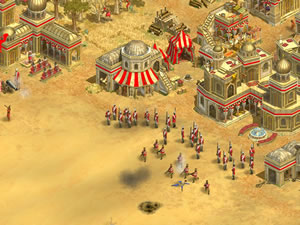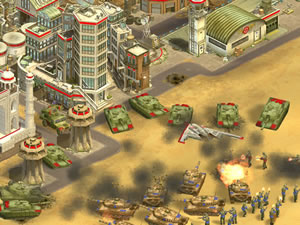Researching spitwad technology.
Ever since I first built a treehouse and stocked it full of water balloons, I
have wanted to conquer the Earth. I figured that with a carefully timed assault,
I could drive the Zimmerman kid down the street out of his treehouse and put my
friend Todd up there, well armed with more water balloons. Thus, treehouse by
treehouse, I could take over a world full of wet people and crush them under my
iron fist.
So
it’s no wonder I like Rise of Nations, the latest game in global domination.
This is the first game from developer Big Huge Games, a company founded by Brian
Reynolds of Civilization II and Alpha Centauri
fame. However, unlike those classics, this is more of a classic real-time strategy
game (RTS) with just a pinch of world building flair thrown in.
In its fundamental gameplay, Rise of Nations plays a lot like the other
Microsoft RTS stronghold, the Age of Empires
series. To build your cities/bases/treehouses you’ll need farms for food, markets
to get the economy flowing, towers for defense, lumber camps for wood, mines
for metal, not to mention granaries, smelters, churches and schools. And of
course you’ll need a barracks, stables and factories to create your water balloon
warriors to go soak you enemies.
While Age of InsertWordHere now includes so many ages, both real
and imaginary, that they must be running out of time periods, Rise of Nations
neatly sidesteps that issue by simply having all of them. From the dawn of civilization,
enforced by wooden spears, to the latest in stealth technology and nuclear weapons,
Rise of Nations is a tour through history. All of it.
This essentially boils down to upgrades. With enough food and wealth and resources, you can bring your nation from the Enlightenment Age into the Industrial Age and turn that stable into an auto manufacturing plant. I’m not going to sit down and count, but there are a lot of upgrades.
The graphics are pretty good, although oddly most things in the game are not
3D, bucking the current craze that drives Nvidia profits ever higher. However,
for sprites, they are quite good; the little men, horses and machines all animate
well and have various different sized models for zooming in and out of the map.
There are unique structures and units for each of the eighteen nations
represented in the game. I really only missed the 3D effect with the larger,
more modern units like battleships and aircraft carriers.
 The
The
sound is right on the money, with battle screams, guns and explosions sounding
as chaotic as they look. The music is orchestral-themed and ranges from very
dramatic to quite peaceful, which is a bit odd during a large war, and belies
the sim game origins of the developers.
But where Rise of Nations really sets itself apart from the pack is
with two innovations: territorial control and a big Risk-like macro game.
In other RTS games, you build a base or two and try and overwhelm your enemy
with little concern about location, other than perhaps control of a rare resource.
But in Rise of Nations, it’s all about map control. All your cities and
castles/forts/bunkers radiate a sphere of influence that connects to others
in your territory, and which actually defines your territory.
This is important in three major ways. First is that you can only build on your territory (and the enemy in his). Second, your tax revenue is largely based on how much of the map you control. And third, unsupplied enemy units and buildings in your territory will take constant “attrition damage.”
This makes the founding and control of cities strategically placed across the map of key importance, especially because cities, once founded, can never be destroyed, only captured. Capture an enemy city and add its sphere of influence to yours and you can visually see the boundaries change between you and you enemy. Other upgrades like religious influence can increase your spheres as well, pushing that border even further. Of course, you have to be careful because your enemy can push back.
I love this feature because it really makes the game more strategic and makes it feel more like a war from the history books, taking key locations and fighting for land a yard at a time, rather than just being about who can out-produce the other guy.
 The
The
second new feature is the global game, which is only available in Campaign mode.
It very closely resembles the board game Risk. You choose your starting nation
(out of about 12) and try to carve out an empire. Meanwhile, the available technology
(and your starting technology) will slowly grow, turn by turn.
While some other games have also had global strategic maps like Emperor:
Battle for Dune and Warlords Battlecry
II, Rise of Nations is a more fully-fleshed strategic game where
adjacent armies can lend support, areas can be fortified, battle cards can be
won and played and control of some territories will give you rare resources
or man-made wonders to aid your nation. Then, once you commit to attack or defend
a territory in question, you get to fight it out in the RTS part of the game.
Add a useful diplomatic system to both the micro and the macro game, and you’ve
really got a great civilization flavored single player game.
But I didn’t enjoy the multiplayer game or the Quick Battle games anywhere
near as much. Since every age in history is available to you on a single map,
you might only spend 10 minutes being medieval, which is a real shame.
I must also mention that the game has crashed on me several times, spitting me out to the desktop. This will almost certainly be fixed in an upcoming patch, but I’ve got to take some points off since they should have fixed that before launching the game.
However, the fantastic single player Campaign of Rise of Nations has
definitely rekindled my interest in global conquest, and I recommend it highly
to any of you with a streak of imperialism. Now, I may not be the leader of
a nation, and my old treehouse was torn down years ago, but maybe if had had
some kind of super-weapon…an intercontinental
ballistic water balloon, perhaps, or sharks
with lasers on their heads…

-
Tons of sides, units and upgrades
-
Territorial control
-
Great campaign
-
<b>Risk
-
Not so great multiplayer
-
Instability issues









